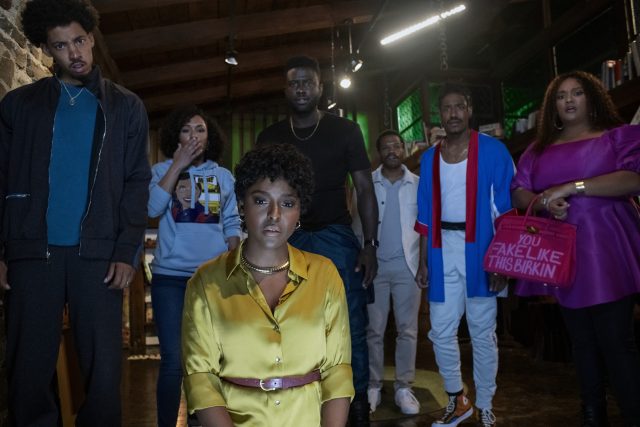
They were friends in college, but it’s been 10 years since the whole group got together. Poor choices and hurt feelings came between them. But that was then, and this is now. And now they’re all getting together in a cabin in the woods to celebrate Juneteenth with a lot of booze, pills and Spades. It’s the perfect setting for something to go horribly wrong.
“I did not expect ‘murderous psychopath in blackface’ was going to be the answer when I asked, ‘Who’s all gonna be there?’” a very exasperated and terrified Dewayne (Dewayne Perkins) says after things really start to go off the rails.
Dewayne is Lisa’s gay best friend. That sounds reductive, but one of the pleasures of The Blackening is how the movie reduces its characters into types, toys with those types, flips them and then falls back on them. It’s a barbed wire of a good time. There’s King (Melvin Gregg), a reformed gangster who married a white girl; Allison (Grace Byers), an activist who struggles with her biracial parentage; party girl Shanika (X Mayo); serial philanderer Nnamdi (Sinqua Walls); and Lisa (Antoinette Robertson), Nnamdi’s ex, Dewayne’s bestie and the center around which the group revolves.
There are two others, Morgan (Yvonne Orji) and Shawn (Jay Pharoah), but they don’t make it out of the first reel. They’re the first to discover the cabin’s sinister game room, complete with an unusual board game featuring a racist caricature that’s just a little too sentient.
The game revolves around Black history and pop culture trivia with Saw-like consequences. It’s what reveals the true nature of the cabin to the group. It’s also one of those contraptions that’s so intricate you wonder how the villain pulls it off. Not that it matters: Logic and puzzle boxes are not the heart of The Blackening; comedy and commentary are.
Based on Perkin’s 2018 viral short, the movie, written by Tracy Oliver and Perkins and directed by Tim Story, is a horror satire where all the characters are aware of the conventional traps of the genre. At one point, Allison suggests that the best way to survive is for the group to split up, to which the rest replies with groans and incredulity. They’ve seen this movie before and know how it turns out.
The Blackening has a lot of fun with these moments, particularly the movie’s running gag of who is Blacker than whom, culminating in what one character calls a high-stakes “Black Sophie’s Choice.” Good jokes are never far from reach here.
There are a lot of insights and aspects of The Blackening that might feel hostile or incendiary in another context, but here, that tension dissipates with every zinger in the script — which makes the tension created by the horror scenario all the more enjoyable. Even as the movie’s villain gives the protracted James Bond-esque speech of his origin and plan, you still wonder who will make it out of this situation alive.
In that regard, The Blackening is like any other horror movie. But where those other movies end with the heroes walking away triumphant (if not emotionally scarred from what they saw and survived), The Blackening ends with a reminder that when a Black person survives hell and high water, they walk back into a world wondering if anyone is going to believe their story.
ON SCREEN: The Blackening opens June 16.














